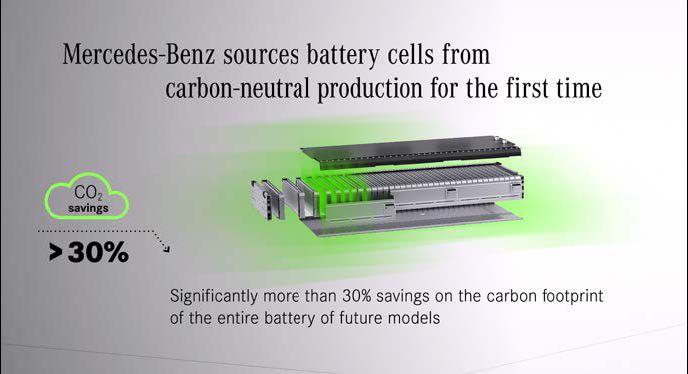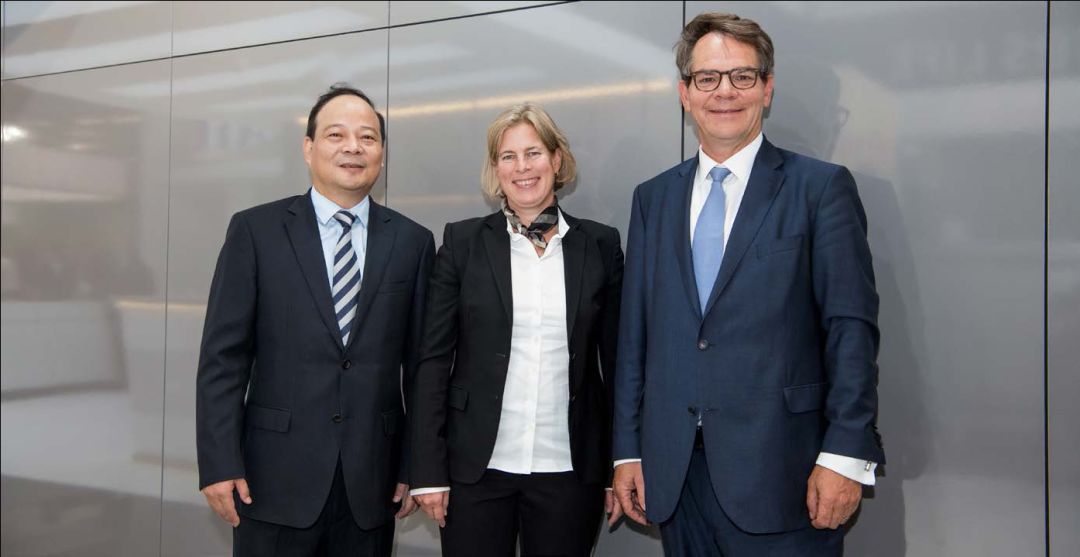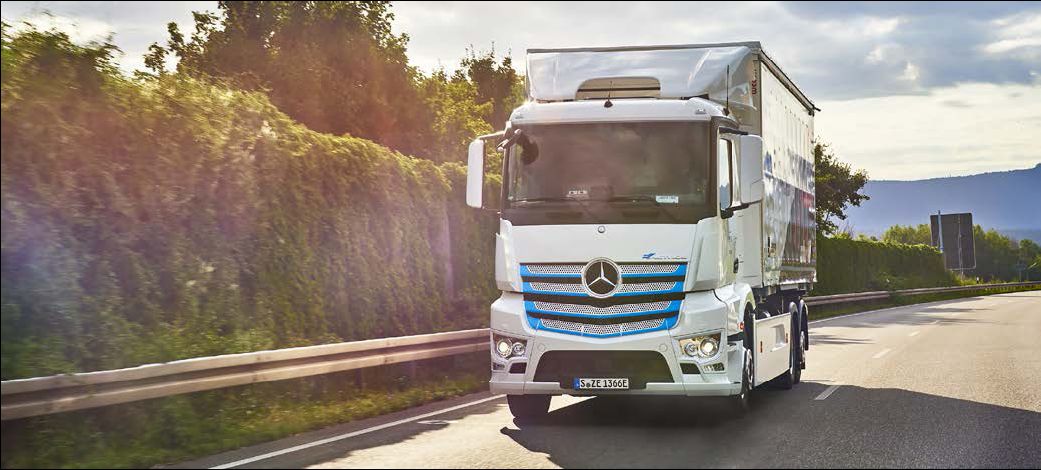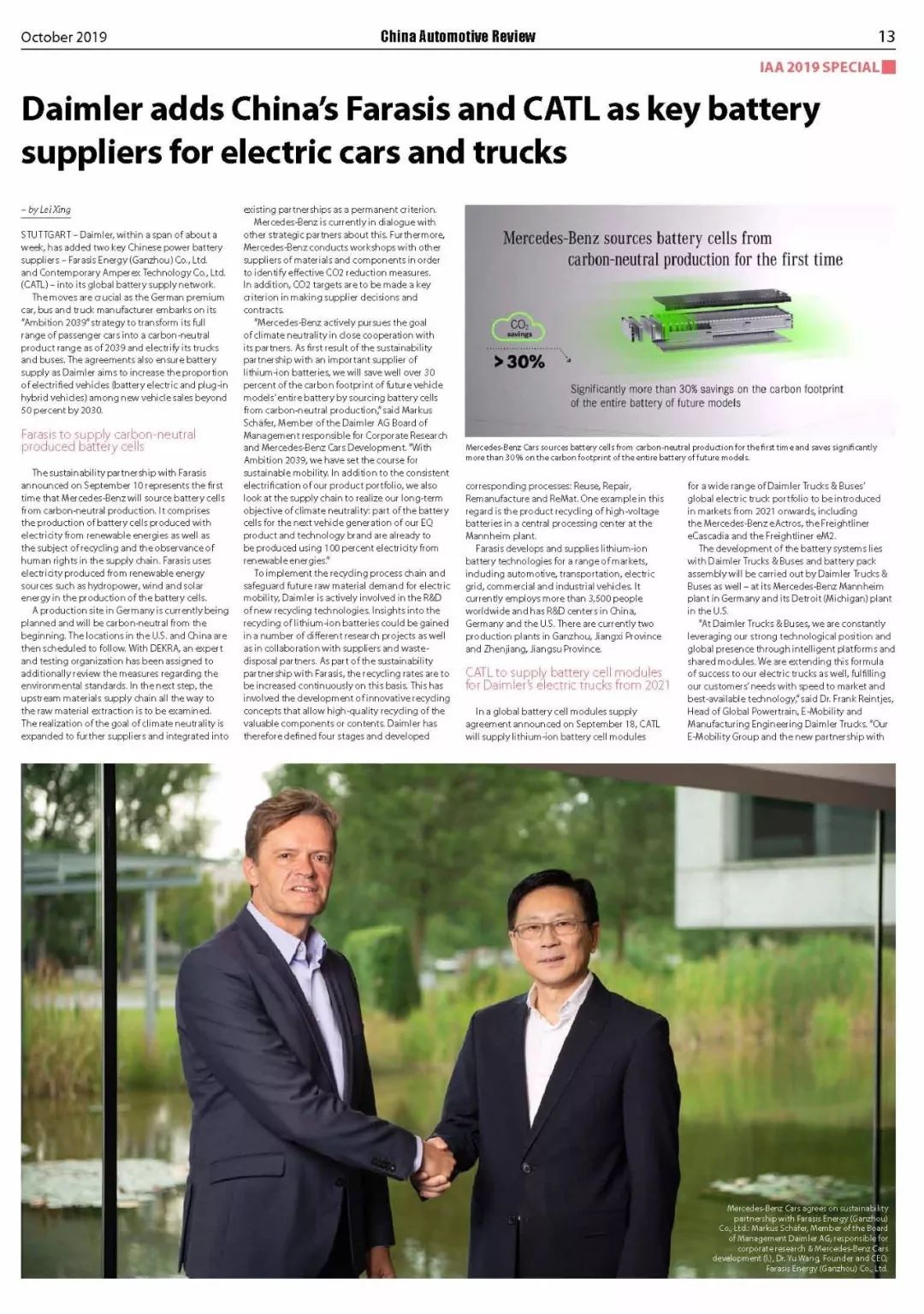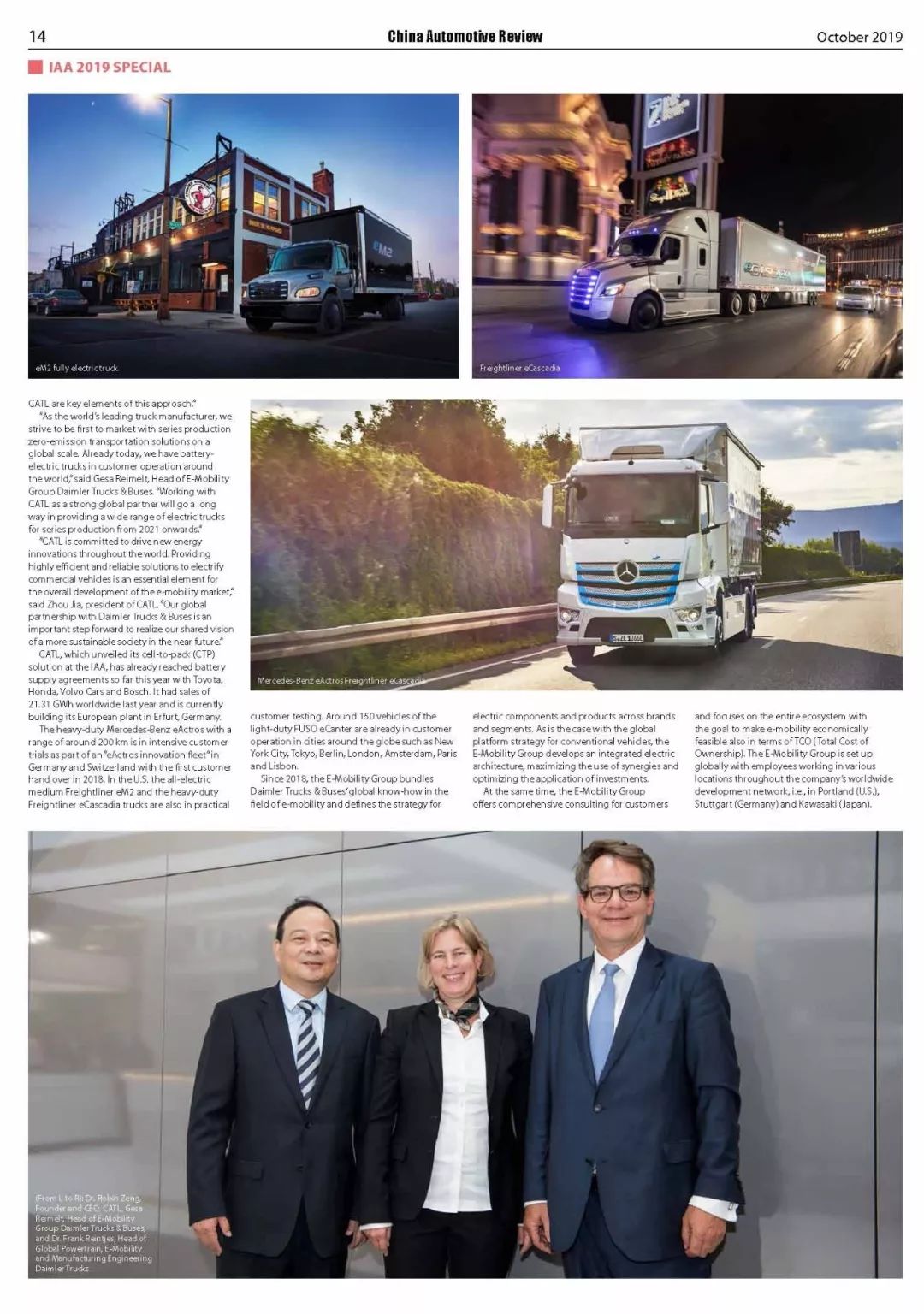STUTTGART – Daimler, within a span of about a week, has added two key Chinese power battery suppliers – Farasis Energy (Ganzhou) Co., Ltd. and Contemporary Amperex Technology Co., Ltd. (CATL) – into its global battery supply network.
The moves are crucial as the German premium car, bus and truck manufacturer embarks on its “Ambition 2039” strategy to transform its full range of passenger cars into a carbon-neutral product range as of 2039 and electrify its trucks and buses. The agreements also ensure battery supply as Daimler aims to increase the proportion of electrified vehicles (battery electric and plug-in hybrid vehicles) among new vehicle sales beyond 50 percent by 2030.
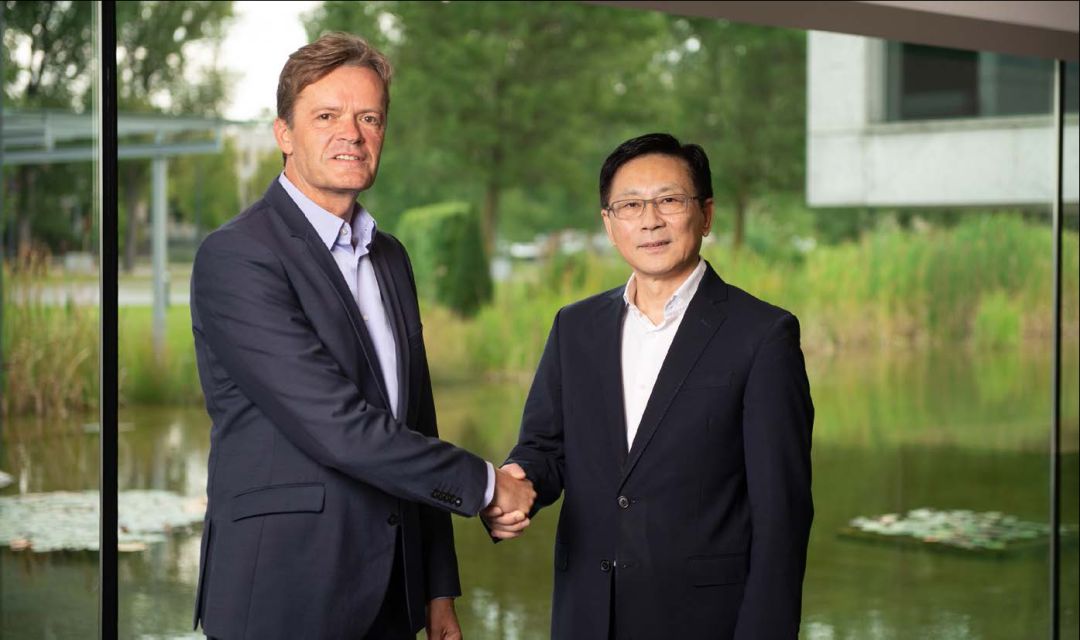
Mercedes-Benz Cars agrees on sustainability partnership with Farasis Energy (Ganzhou) Co., Ltd.: Markus Schäfer, Member of the Board of Management Daimler AG, responsible for corporate research & Mercedes-Benz Cars development (l.), Dr. Yu Wang, Founder and CEO, Farasis Energy (Ganzhou) Co., Ltd.
Farasis to supply carbon-neutral produced battery cells
The sustainability partnership with Farasis announced on September 10 represents the first time that Mercedes-Benz will source battery cells from carbon-neutral production. It comprises the production of battery cells produced with electricity from renewable energies as well as the subject of recycling and the observance of human rights in the supply chain. Farasis uses electricity produced from renewable energy sources such as hydropower, wind and solar energy in the production of the battery cells.
A production site in Germany is currently being planned and will be carbon-neutral from the beginning. The locations in the U.S. and China are then scheduled to follow. With DEKRA, an expert and testing organization has been assigned to additionally review the measures regarding the environmental standards. In the next step, the upstream materials supply chain all the way to the raw material extraction is to be examined. The realization of the goal of climate neutrality is expanded to further suppliers and integrated into existing partnerships as a permanent criterion.
Mercedes-Benz is currently in dialogue with other strategic partners about this. Furthermore, Mercedes-Benz conducts workshops with other suppliers of materials and components in order to identify effective CO2 reduction measures. In addition, CO2 targets are to be made a key criterion in making supplier decisions and contracts.
“Mercedes-Benz actively pursues the goal of climate neutrality in close cooperation with its partners. As first result of the sustainability partnership with an important supplier of lithium-ion batteries, we will save well over 30 percent of the carbon footprint of future vehicle models' entire battery by sourcing battery cells from carbon-neutral production,” said Markus Schäfer, Member of the Daimler AG Board of Management responsible for Corporate Research and Mercedes-Benz Cars Development. “With Ambition 2039, we have set the course for sustainable mobility. In addition to the consistent electrification of our product portfolio, we also look at the supply chain to realize our long-term objective of climate neutrality: part of the battery cells for the next vehicle generation of our EQ product and technology brand are already to be produced using 100 percent electricity from renewable energies.”
To implement the recycling process chain and safeguard future raw material demand for electric mobility, Daimler is actively involved in the R&D of new recycling technologies. Insights into the recycling of lithium-ion batteries could be gained in a number of different research projects as well as in collaboration with suppliers and waste-disposal partners. As part of the sustainability partnership with Farasis, the recycling rates are to be increased continuously on this basis. This has involved the development of innovative recycling concepts that allow high-quality recycling of the valuable components or contents. Daimler has therefore defined four stages and developed corresponding processes: Reuse, Repair, Remanufacture and ReMat. One example in this regard is the product recycling of high-voltage batteries in a central processing center at the Mannheim plant.
Farasis develops and supplies lithium-ion battery technologies for a range of markets, including automotive, transportation, electric grid, commercial and industrial vehicles. It currently employs more than 3,500 people worldwide and has R&D centers in China, Germany and the U.S. There are currently two production plants in Ganzhou, Jiangxi Province and Zhenjiang, Jiangsu Province.
CATL to supply battery cell modules for Daimler's electric trucks from 2021
In a global battery cell modules supply agreement announced on September 18, CATL will supply lithium-ion battery cell modules for a wide range of Daimler Trucks & Buses' global electric truck portfolio to be introduced in markets from 2021 onwards, including the Mercedes-Benz eActros, the Freightliner eCascadia and the Freightliner eM2.
The development of the battery systems lies with Daimler Trucks & Buses and battery pack assembly will be carried out by Daimler Trucks & Buses as well – at its Mercedes-Benz Mannheim plant in Germany and its Detroit (Michigan) plant in the U.S.
“At Daimler Trucks & Buses, we are constantly leveraging our strong technological position and global presence through intelligent platforms and shared modules. We are extending this formula of success to our electric trucks as well, fulfilling our customers' needs with speed to market and best-available technology,” said Dr. Frank Reintjes, Head of Global Powertrain, E-Mobility and Manufacturing Engineering Daimler Trucks. “Our E-Mobility Group and the new partnership with CATL are key elements of this approach.”
(From L to R): Dr. Robin Zeng, Founder and CEO, CATL, Gesa Reimelt, Head of E-Mobility Group Daimler Trucks & Buses, and Dr. Frank Reintjes, Head of Global Powertrain, E-Mobility and Manufacturing Engineering Daimler Trucks
“As the world's leading truck manufacturer, we strive to be first to market with series production zero-emission transportation solutions on a global scale. Already today, we have battery-electric trucks in customer operation around the world,” said Gesa Reimelt, Head of E-Mobility Group Daimler Trucks & Buses. “Working with CATL as a strong global partner will go a long way in providing a wide range of electric trucks for series production from 2021 onwards.”
“CATL is committed to drive new energy innovations throughout the world. Providing highly efficient and reliable solutions to electrify commercial vehicles is an essential element for the overall development of the e-mobility market,” said Zhou Jia, president of CATL. “Our global partnership with Daimler Trucks & Buses is an important step forward to realize our shared vision of a more sustainable society in the near future.”
CATL, which unveiled its cell-to-pack (CTP) solution at the IAA, has already reached battery supply agreements so far this year with Toyota, Honda, Volvo Cars and Bosch. It had sales of 21.31 GWh worldwide last year and is currently building its European plant in Erfurt, Germany.
Mercedes-Benz eActros Freightliner eCascadia
The heavy-duty Mercedes-Benz eActros with a range of around 200 km is in intensive customer trials as part of an “eActros innovation fleet” in Germany and Switzerland with the first customer hand over in 2018. In the U.S. the all-electric medium Freightliner eM2 and the heavy-duty Freightliner eCascadia trucks are also in practical customer testing. Around 150 vehicles of the light-duty FUSO eCanter are already in customer operation in cities around the globe such as New York City, Tokyo, Berlin, London, Amsterdam, Paris and Lisbon.
Since 2018, the E-Mobility Group bundles Daimler Trucks & Buses' global know-how in the field of e-mobility and defines the strategy for electric components and products across brands and segments. As is the case with the global platform strategy for conventional vehicles, the E-Mobility Group develops an integrated electric architecture, maximizing the use of synergies and optimizing the application of investments.
At the same time, the E-Mobility Group offers comprehensive consulting for customers and focuses on the entire ecosystem with the goal to make e-mobility economically feasible also in terms of TCO (Total Cost of Ownership). The E-Mobility Group is set up globally with employees working in various locations throughout the company's worldwide development network, i.e., in Portland (U.S.), Stuttgart (Germany) and Kawasaki (Japan).
This article appeared in the October 2019 (Vol.14, No.10) issue of China Automotive Review (CAR), our monthly publication in English exclusively focused on the Chinese auto industry. If you would like to read this information-packed monthly report on the Chinese automotive market (in PDF format on a paid basis), please send your subscription to us at: sub@cbuauto.com.cn


